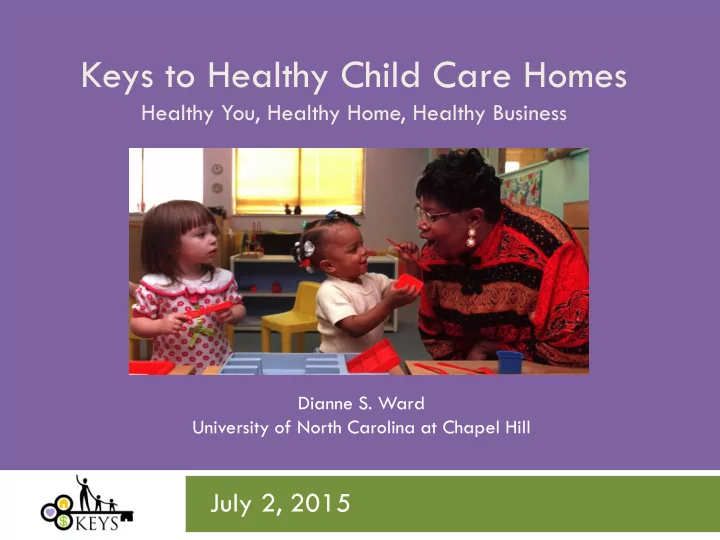

Keys to Healthy Child Care Homes Healthy You, Healthy Home, Healthy Business Dianne S. Ward University of North Carolina at Chapel Hill July 2, 2015
Promoting Healthy Behaviors through Family Child Care Homes In the US, 32% of children are overweight or obese. Early childhood (0-5yrs) is a critical period of development when many weight-related behaviors take root. About 60% of US children under the age of 6 are in some type of non-parental care each week for approximately 25 hours. Family child care homes (FCCHs) are an important source of care for America’s children FCCHs serve approximately 1.5 million children in the US
Two Research Groups – Working Together Our group (UNC) have been working in child care settings for many years Developed the NAP SACC program Have history working with state/local child care organizations Colleagues (Duke University) have experience with family-based interventions (Truls Ostbye) and child care (Sara Benjamin-Neelon) Working together, we developed KEYS
Formative Research Preliminary survey of family child care providers Found 74% survey respondents were overweight/obese Little had training in nutrition/physical activity Implemented small pilot (n=5 providers, 15 children) 80% African American with some college education 80% overweight/obese Providers did not obtain much MVPA during work day (~13 min) Low intake of FV Children had high levels of sedentary behavior and 20 min of MVPA Food quality (HEI score) was 64.3, below the recommended level of 80 out of possible100 points Received input from our NAP SACC Child Care Advisory Committee
Primary Aims Aim 1 . Improve physical activity behaviors of children while at the FCCH. Aim 2. Improve quality of dietary intake of children while at the FCCH. Funding from NIH NHLBI R01 1HL108390-01A1 2012-2017
Secondary Aims Aim 3. Reduce excess weight gain in children. Aim 4. Improve physical activity behaviors and diet quality of FCCH providers. Aim 5. Improve the nutrition and physical activity environment at the FCCH.
Study Design Cluster randomized trial Sample 165 FCCH providers 495 children Randomized 1:1 Two-arms Arm 1 = Keys Intervention Arm 2 = Healthy Business Measured baseline and follow-up Children’s diet quality & physical activity (PA) Child BMI Provider diet, PA, , and FCCH environmental characteristics
Measures Method of Variable Measure Child Provider Measurement Actigraph GT3X Accelerometer X X Objective monitor Physical Activity (MVPA) Physical Activity Self Report X Survey Diet Observation for Childcare X Observation (DOCC) Diet Quality (Healthy Eating Index) Block Brief 2000 Food Frequency X Survey (FFQ) Anthropometrics Shorr Stadiometer In person X X - Height (in) measure taken by Seca Scale X X - Weight (lbs) data collector Environment and Policy Assessment X Observation Family Child Care Observation (EPAO)-FCCH Home Environment EPAO Document Review X Document Review - Physical & Social Environment Portion of EPAO-SR used to capture - Policies potentially unobserved provider X Survey - Provider PA & behaviors nutrition practices New items added to BAS to capture - Provider-parent provider-parent communication X Survey communication about PA and nutrition
Measures: Continued Variable Measure Child Provider Method of Measurement Demographics Demographics Questionnaire X X Parent and provider survey Psychosocial constructs Psychosocial Questionnaires X Survey - Intrinsic Motivation Inventory - Self-efficacy for provider’s own PA & nutrition - Medical Outcomes Study Sleep Scale - Perceived Stress Scale Business Practices Business Administration Scale (BAS) X Survey
Intervention – Conceptual Model
Intervention Development Used Intervention Mapping to developing content and delivery methods Focus on Social Cognitive Theory Created educational print materials Developed workshop with skills building activities Use of Motivational Interviewing to build self-efficacy to foster autonomy in setting/meeting goals Community Advisory Committee reviewed study materials
Intervention Group
Comparison Group Tom Copeland, Red Leaf Press http://www.tomcopelandblog.com/
Intervention Materials
Intervention Materials: Healthy You
Intervention Materials: Healthy Home
Healthy Business
Coaches: Keys to Success Motivational interviewing training Develop a personal relationship with each provider Customized support Tangible resources Be flexible and understanding
Project Timeline Recruitment occurred in 5 waves over multiple counties Targeted counties with high child obesity rates Finalize recruitment in June Two waves have completed the intervention; will finish all waves by May of 2016
Recruitment Efforts Recruitment Challenges Study website Busy providers Demands of research project (measures) Parent recruitment Trust Strategies to Overcome Personal contact Working with local CC staff Good materials/poster http://keystohealthyhomes.org/
Study Participants (to date) Participant Characteristics from Waves 1-4 Providers Children (n=125) (n=370) Gender 100% female 52% female Age 49.7 years 35.7 months Race 79% Black 66% Black BMI status 89% overweight/obese 34% overweight/obese Center Quality 65% 4-5 stars Rating* * NC’s Quality Rating System
Family Child Care Homes An important connection to many children and families FCCH providers need support for their own health practices Families they serve can benefit from health promotion Many providers are interested but reaching them will require additional efforts First step: an evidence-based program such as KEYS We are working to create that evidence
Keys Team Investigators: Dianne Ward • All the family child care Truls Ostbye participants, their children, and Derek Hales families Sara Benjamin-Neelon • Local child care partnerships Shrikant Bangdiwala • Our community advisory Ziya Gizlice (data) committee Staff: Amber Vaughn Regan Burney Courtney Mann Meghan Mayhew Joy Long Sakinah Omar
Recommend
More recommend